Just as the long hot summer of 1976 had given birth to Punk, the long, cold winter of 1979 spawned the now legendary, New Wave Of British Heavy Metal (NWOBHM), a movement of such magnitude that it is still being talked about more than twenty years later. Hard rocking, fast, loud, aggressive, NWOBHM captured the imagination of those disillusioned with disco, put-off by punk and nonplussed by the emerging New-Romantics. It also brought forth: Demon.






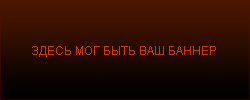
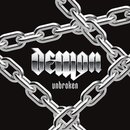
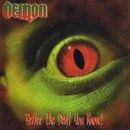
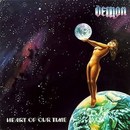
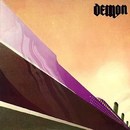
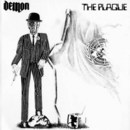
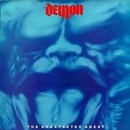
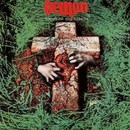



Formed during the first wave of NWOBHM by lyricist/vocalist Dave Hill and guitarist Mal Spooner, with Paul Riley on bass, Clive Cook on guitar and John Wright on drums, the Midlands quintet hooked up with Clay Records supremo, Mike Stone, in 1980, to release their first single, 'Liar'. Issued on blood-red vinyl, in a limited edition run of just 5000 copies, Liar marked the beginning of an incredible story spanning two decades - and counting.
In the beginning, he gave us the word - Night of the Demon 1981
January 1981 saw the band venture into the studio to record their first album, 'Night of the Demon', whilst Clay Records struck a licensing deal with Carrere Records, to secure the album's release. Half tales of mystery and imagination, half straight-ahead rock, 'Night of the Demon' was both powerful and thoughtful - polished metal of the highest quality. Another single, 'Ride the Wind', also taken from the album, followed. The Demon machine was starting to gather momentum, which was infused with energy by the interest of Radio 1 DJ Tommy Vance. Invited to the BBC's studios at Maida Vale, in London, to record four tracks for broadcast on Tommy's Friday Rock Show, Demon produced one of the Radio 1 sessions of the year with rousing renditions of 'Full Moon'/'Night of the Demon', 'One Helluva Night', 'Father of Time' and 'Decisions'. As the second single from the album, 'One Helluva Night', was released, Riley and Cook left the band, to be replaced by Chris Ellis and Les Hunt, respectively.
Is it fact, or is it fantasy? - The Unexpected Guest 1982
Buoyed by the interest and critical acclaim that the first album had received, the new look line-up decamped to Bray Studios, fabled home of Hammer Films, early in 1982, to record their second album, 'The Unexpected Guest'. Even today, two decades on, people still talk about 'The Unexpected Guest' in reverential terms, many citing it as one of the most powerful and finest examples of its genre. Certainly, it showcased the band's distinctive musical stylings and the thoughtful, imaginative lyrics of Dave Hill and Mal Spooner. The addition of Andy Richards on keyboards gave yet more depth to the already expansive Demon sound. Furthermore, this second LP offering was more complete, flowing easily from beginning to end, demonstrating that the band had progressed and grown during the previous year. In July of 1982 another single, 'Have We Been Here Before?' was released and the band hit the road for a series of live promotional gigs.
The live shows of this era were something to behold. Straight out of the schlock-horror handbook, each performance guaranteed a gore-fest of stomach-churning intensity. For 'Night of the Demon' Dave would don a latex Demon costume and horned Devil mask, giving the impression that he was taking his annual holiday from the ninth circle of Hell. The stage was appropriately adorned with all manner of funereal trappings and monumental masonry, including an open grave, blowing leaves and two, giant, white crucifixes! Later in the show, Dave would appear, in all his hideously wrinkled glory, first as the 'Father of Time', and then as the Madman pictured on the gatefold sleeve of 'The Unexpected Guest'. Naturally, the rest of the band was not excluded from sharing their bloodletting tendencies with the assembled throng. Les Hunt was known, on occasion, to bleed profusely from the multiple puncture wounds in his arms. What is more, all of this was performed to some of the loudest, heaviest heavy rock of the time. Since both Alice Cooper and KISS had foresworn make-up, costumes and ghoulish accessories, Demon was widely held to be the hottest live ticket in town.
Run free, you Superman - The Plague 1983
It had seemed, in 1982, that musically, lyrically and visually, Demon were in the fast lane to the top, just as stadium rock was becoming de rigeur. Had Carrere Records had the vision and the cojones to invest in Team Demon, their music, their style and their consummate professionalism would, surely, have seen them go stratospheric - but it was not to be. Carrere Records, being both hearing and visually impaired, turned down the demos for 'The Plague', bemoaning the lack of single material. The band, not about to be compromised, in any way, parted company with Carrere. Demon stayed with manager Mike Stone and Clay Records. Their first two albums had shown their talents musically and lyrically and their live performances had clearly demonstrated that it was no fluke. If anything, they were better live than on vinyl. Their third album would be released by Clay Records in the UK and a deal was struck with Atlantic in the US.
In June 1983, 'The Plague' hit the racks. It was not the monsters and demons fare of the first two releases. As Dave Hill said in a contemporary interview: "I think we did the devil stuff proud, but this band has always had more to offer than that." Not only did 'The Plague' mark a definite change in musical direction, with more space being given to the keyboards, whilst maintaining Mal Spooner's hard-edged guitar riffs, lyrically it was less dark - but no less sharp. Tales of nightmarish visions of a subterranean inferno were subtly replaced with visions of an alternative Hell, one more real and sharply defined - the selfish, consumerist, society of the early '80s. The keenly observed lyrics of 'The Plague' combined with a wonderfully balanced and produced musical tour-de-force, to deliver what is generally considered to be a classic album, not just of its type, but of any type. Packaged in a gatefold sleeve with wonderfully cynical, pencil drawings of a decaying, Thatcherite Britain in pre-1984 decline, 'The Plague' should have been a massive success. Alas, although, 'The Plague' reached number two in the Heavy Metal charts and made the UK Top 50, and the title track was released as a single, true success still eluded them. As Andy Richards, Chris Ellis and Les Hunt all left to pursue other avenues. Demon entered a period of transition.
British Standard, where's the standard? - British Standard Approved 1985
Unfortunately, this period of transition would prove to be a traumatic time for everyone connected with the band. Demon had, undoubtedly, created a large cult following with their first three recordings and pressure mounted for a fourth album. Steve Watts joined as resident keyboard wizard, Gavin Sutherland filled in on bass and, a friend of Mals, John Waterhouse, added another guitar to the sound. A single, 'Wonderland', from the forthcoming album and featuring the new line-up, was released in December 1984. However, unknown to fans, Mal had become progressively more ill during late 1984 and his condition deteriorated during the recording of, what would eventually see the light of day as, 'British Standard Approved'. Tragically, Mal succumbed to pneumonia and passed away on December 10th 1984, just seven days after completing recording. 'BSA' was eventually released in April 1985, as a tribute to Mal.
Playing for real, expressing the way that we feel - Heart of Our Time 1985
A remix of Wonderland was released in July 1985 and, whilst Demon would still record some of their finest work in the years to come, 'Heart of Our Time', released in December 1985, clearly shows a band experimenting. They needed to see if they could continue, following the loss of co-founder and mainstay of the original line-up, Mal Spooner. Nevertheless, the signs were promising. Dave struck up a writing partnership, with new keyboard player Steve Watts, and with Andy Dale joining on bass, the band took to the road to play some live dates, during 1986.
This is the big chance of your life - Breakout 1987
During the first half of 1987, 'The Unexpected Guest' was re-released and, in June 1987, a new album, 'Breakout' was released, demonstrating the power of the new band and the efficacy of the Hill/Watts writing collaboration. Songs such as 'Life on the Wire', 'England's Glory', 'Standing in the Shadows', 'Big Chance' and the title track, 'Breakout' clearly defined the quality of this latest incarnation. Yet another change in attitude and direction was evident, with the lyrics focusing on more contemporary topics, such as war, politics, drug use, consumerism and patriotism. Musically, the new recordings retained the heavy atmosphere, suffused with subtlety, of the traditional Demon sound, and featured some magnificent arrangements, massively dynamic soundscapes and epic ballads.
The stability that had been created during recording of 'Breakout' was retained when drummer John Wright left the fold and was replaced by Scot Crawford, and even enhanced when John Waterhouse was joined on guitar by Steve Brookes, formerly of punk band Discharge. A well-received German tour in November 1987, and steady sales of 'Breakout', resulted in the band touring Britain for the first time in more than a year.
Mike Stone's careful licensing of Demon material, over the years, had meant that, unlike many of their contemporaries, Demon had actually retained the rights to their recordings. Consequently, they were able to re-release 'Night of the Demon' early in 1988, as well as a new single, 'Tonight (The Hero is Back)'.
I pray they find a peace - Taking the world by storm 1989
In March 1989, Nick Bushell, another Discharge refugee, took over from Andy Dale on bass and Demon Feedback, an information newsletter was established to keep fans, worldwide, apprised of the band's movements.